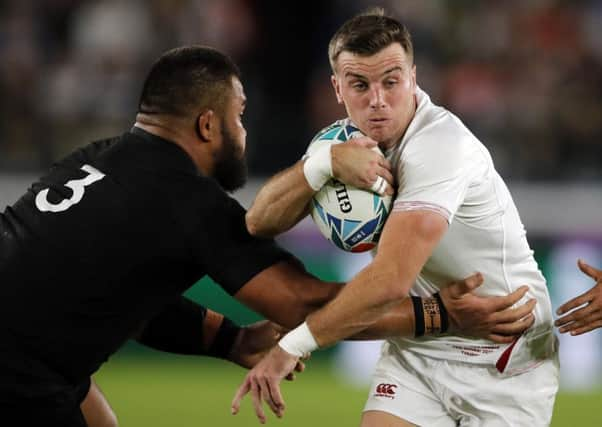Allan Massie: England were very good and, God help us, can improve


Nevertheless, this was as fine an English performance as I can remember seeing. They played fast, controlled, ferocious and intelligent rugby, and they completely dominated a New Zealand team that had scored 40 points against Ireland a week ago. The All Blacks defended heroically but they were beaten in every aspect of the game. England have often in recent years been accused of being unable to adapt their game when it isn’t working. Well, this time it was New Zealand who couldn’t adapt. They looked as if their brains were scrambled. I never thought to see the All Blacks being so thoroughly dismantled. Even when they were gifted a soft try – the only real mistake England made – they couldn’t build on it. England at once pinned them back in their 22. The England team that won the World Cup in 2003 had half-a-dozen players approaching the end of their international career. This one – God help us – has room for improvement. It resembles the 2003 team in one important respect. It has two genuine outstanding flankers, something England have lacked for years: Neil Back and Richard Hill then, Sam Underhill and Tom Curry today.
It helped that Eddie Jones reverted to his best midfield combination. Owen Farrell is a better 12 than 10. George Ford is now the best stand-off at game-management in the northern hemisphere, as good as Rob Andrew was in the early nineties. In contrast, the All Blacks were frenetic when they needed to be calm. What they would have given for Dan Carter in his prime, a stand-off capable of calming things and putting the ball in the right areas. As it was, they had no one capable of changing a losing game. So the All Blacks were out-thought as well as out-played.
Advertisement
Hide AdAdvertisement
Hide AdFor English fans this must count as the best day of their rugby life, for New Zealanders one the most painful. For the uncommitted, it was a wonderfully exciting match. At times it was as free-flowing as a Barbarians game, but one in which tackling was ferocious and the result really mattered.
The other semi-final was very different, a reminder that there’s more than one way of playing rugby. Some posting on social media have called it boring. I found it fascinating: no cavalry, just the poor bloody infantry slogging it out. If there had been nothing much at stake then, yes, I’d have called it dull rugby. But, in the circumstances, it was gripping because you knew that any lapse of concentration would lose such a close and tense encounter. There was an awful lot of kicking, not because neither side wanted to run the ball, but because the contest at the tackle area was so intense that quick clean ball was rare. South Africa just shaded the match and this was principally because Faf de Klerk’s kicking at the base of the scrum asked more questions of Wales than either of the Welsh scrum-halves did of the Springboks. He has been one of the star players of the tournament and it will be fascinating to see if he can ask the same difficult questions of the English.
The final promises to be fascinating, especially if both teams play in the same style as they did this weekend. The Springbok pack is more powerful and more cohesive than the All Blacks one. New Zealand’s line-out was a shambles, South Africa have hardly lost a line-out on their own throw in the tournament. Their back row, in which the No 7 Pieter-Steph du Toit was tremendous, can be a match for England’s and they will surely seek to get England on the back foot and make them play from deep. On the other hand, while Wales played with great courage and skill – and one feels for them, going out after coming so close – they also played the sort of game that suited the Springboks.
England will surely seek to play faster and wider and to ask questions which the Welsh were almost never able to pose.
England have been hugely impressive and will deservedly start favourites. But there’s a calm certainty about this South African team that stems from their coach, Rassie Erasmus, inset, a man of few words and even fewer quotable sound-bites, very different from Eddie Jones. Erasmus is not only steeped in Springbok tradition, he learned a lot from his time coaching Munster and, over the years, Munster teams have won many matches in which they started as underdogs. If you think of this South African side as a super-Munster, you won’t write them off. But England are very very good and capable of getting better still.